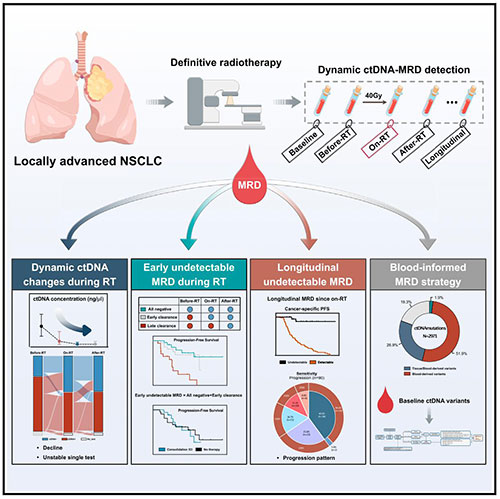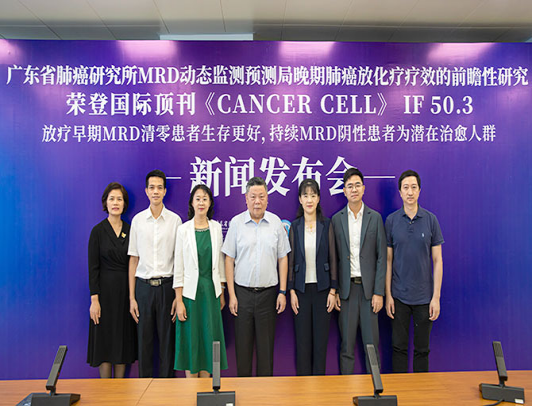

At 11:00 p.m. on the evening of October 9, 2023, Cancer Cell (IF=50.3), a top-tier journal in oncology, officially launched the latest lung cancer MRD research findings of the multidisciplinary team led by Prof. Wu Yilong from the Cancer Hospital, Guangdong Provincial People’s Hospital, titled “Dynamic circulating tumor DNA during chemoradiotherapy predicts clinical outcomes for locally advanced non-small cell lung cancer patients”, revealing the variation characteristics and application value of detecting blood MRDs during chemoradiotherapy in locally advanced lung cancer patients. It was confirmed that those MRD-zero identified accurately and effectively in the early stage of radiotherapy remained sustained MRD-negative after the end of chemoradiotherapy, with a two-year probability of non-recurrence of as high as 88.4%! If this achievement is extended and applied clinically, it may free sustained MRD-negative patients from prolonged immunotherapy, and provide them with an opportunity to avoid costs and side effects arising from overtreatment.

Non-small cell lung cancer accounts for 85% of lung cancer, and 30%-35% of lung cancer patients are locally advanced at diagnosis. Compared to surgery, radical chemoradiotherapy is the main therapy for locally advanced lung cancer. In recent years, the progress of research is as follows: Compared to chemoradiotherapy alone, chemoradiotherapy combined with consolidation immunotherapy has increased the 5-year progression-free survival of unresectable locally advanced non-small cell lung cancer patients by 14%, reduced the risk of tumor recurrence by nearly 50%, and become a new standard therapeutic model. However, this new model has also brought a new problem: Medical research has confirmed that 19% of patients have been cured after chemoradiotherapy, and continued immunotherapy has no survival benefit, but instead increases patients’ adverse drug reactions and financial burden.
Molecular residual diseases (MRDs) refer to cancer-derived mutant molecular signals discovered during the deep genetic testing of peripheral blood. Currently, lung cancer MRD detection is gradually shifting to the clinical field, mostly for monitoring the risk of recurrence after lung cancer surgery. In 2018, Prof. Wu Yilong led the design of a trilogy of lung cancer MRD research. After several years of data accumulation, he published the Stage I results of early-to-middle-stage lung cancer surgery in Cancer Discovery (IF=39.4) in 2022, highlighting the negative predictive value of postoperative MRDs in lung cancer. This achievement was just from Stage II of the MRD serial studies conducted by the Guangdong Lung Cancer Institute.
139 unresectable locally advanced non-small cell lung cancer patients were included in this study in total, from whom 10-20 milliliters of blood were drawn at key points, such as baseline, before, during, and after radiotherapy, and every 3-6 months during immunotherapy, with 761 blood samples collected for MRD testing in total. This study found that early-stage MRD-zero patients, namely those MRD-negative in the middle and late stages of radiotherapy, had similar prognoses whether they received immune consolidation treatment or not. As of now, 90 patients in this study have experienced tumor recurrence, with only two tested MRD-negative at the time of recurrence, and the other 88 tested MRD-positive 4 months (median) before recurrence. Even in patients with brain metastasis, the sensitivity of MRD testing is as high as 97.8%!
Another important achievement is that potentially cured patients were identified. This study has confirmed that among the locally advanced patients who remained MRD-negative after chemoradiotherapy, only two experienced tumor recurrence, with a two-year progression-free survival of as high as 88.4%.
This study proposes the concept of “MRD-zero in the early stage of radiotherapy” innovatively for the first time, and confirms that early-stage MRD-zero patients have a better prognosis, and do not necessarily require long-term immune consolidation. This is an important breakthrough in the clinical application of locally advanced MRDs, and will be further substantiated by a real-world study by the Guangdong Lung Cancer Institute, which can relieve some patients from overtreatment. In addition, this study further proves the important fact that being sustained MRD-negative is a potential cure. These research findings will be translated into practical clinical work gradually to realize the core value of translational medicine and truly benefit patients.
This study is the best demonstration of the multidisciplinary academic capabilities of the Guangdong Lung Cancer Institute. The first authors of this study are Prof. Pan Yi, Deputy Director of the Department of Radiotherapy, and Dr. Zhang Jiatao from the Department of Pulmonary Surgery. The corresponding authors include Prof. Zhou Qing from the Department of Pulmonary Medicine and Dr. Yi Xin, a bioinformatics expert from Beijing GenePlus Technology Co., Ltd. The research team also includes talents in multiple disciplines, and teamwork is an important prerequisite to the success of this study.

Research team (from left: Director Gan Bin, Deputy Director Chen Huajun, President Zhou Qing, Prof. Wu Yilong, Deputy Director Pan Yi, Dr. Zhang Jiatao, and Director Zhong Wenzhao)
Zhang Jiatao, Pan Yi, Zhou Qing
Updated: Oct 10, 2023